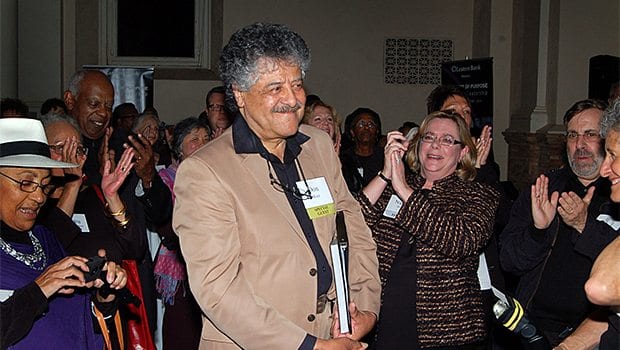

Author: Michael HaileyJournalist Kenneth Cooper and photographer Don West sign copies of “Portraits of Purpose.”
The function room at the Boston Public Library was filled with a Who’s Who of black Boston — past and present elected officials, bankers, artists, community activists, writers, lawyers — spanning decades of the city’s history.
The atmosphere was like a family reunion, with people from all walks of life whose lives have intersected in civil rights struggles, mayoral administrations, artistic movements and now in photographer Don West’s book, “Portraits of Purpose.”
Not all the subjects of his photos are African American, but all are people who have in one way or another made contributions great and small to the black community in Greater Boston.
“I see you as a visionary vanguard who picked up where the Civil Rights Movement left off,” West said, addressing the gathering. “You realized that despite the advances made, it was necessary to finish the unfinished business of achieving racial equity.”
The product of more than 30 years of portraiture, West’s book is as much about Boston’s black community as it is about the individuals appearing in the black-and-white photographs that populate its pages. In some portraits, the subjects are posed. In most, they’re caught in candid moments. In all, the subjects are presented in the environment in which they function — amid the protests, celebrations and news events that defined their roles in Boston’s history in the last 30 years.
“It’s a family book, in a sense, because this is a family,” said Roxbury artist Napoleon Jones-Henderson. “Don’s somebody who has a relationship with everybody who’s in the book. He’s always been about the business of capturing people.”
The roots of West’s photographic style extend to his days as a press photographer, initially for United Press International.
“When we would go out on assignments we would have to come back with at least one picture that would capture the whole story,” West said. “That taught me how to assess a situation with an eye toward how to put a picture together.”
As a staff photographer for the Banner in the 1980s, West documented the movements, struggles and successes of the black community. Many of the photographs in Portraits of Purpose were culled from West’s work in that era. The depictions of his subjects are informed by his journalistic sensibilities.
“My approach, fundamentally, in anything that I do, is trying to capture the essence or the truth of a person or a situation,” West told the Banner. “I try to capture some central value or emotion.”
That approach, according to Jones-Henderson, give’s West’s work a unique style.
“His work is distinctive,” he said. “You take him, [photographers] Lou Jones, Hakim Raquib — each of them, when you see their work, you know it. Don has made a career documenting the people of the community.”
African National Congress activist Themba Vilakazi, who helped coordinate local efforts to divest city investments in companies doing business in South Africa, is featured in a pre-1990 photo, wearing a “Free South Africa” T-shirt, a telephone receiver pressed to his ear. Former South African President Nelson Mandela, for whom West served as official photographer during his 1990 visit to Boston, smiles broadly as if savoring the victory achieved through decades of struggle.
Nation of Islam Minister Don Muhammad, caught in mid-speech, jabs his fingers at the camera, a portrait of the sect’s founder, Elijah Muhammad, looming in the background. The late artist Jim Reed strikes a pensive pose while resting his cheek on a hand clutching a collection of brushes. Like West, Reed captured decades of black Boston history great and small in his portraits, one of which is just out of focus in the background of West’s photo.
Photographer Hakim Raquib, who printed many of the photographs for West, said he sees an evolution of West’s style in the collection.
“His vision became more introspective,” Raquib said. “He waits for the moment when you get the story that’s in the subject’s eyes. There’s a lot to that. What’s he’s done is amazing. This is something he’s worked on for a long time. To see it come to fruition is beautiful.”

Author: Randy GoodmanHarvard Law Professor Charles Ogletree speaks during Don West’s book signing event.
West first displayed the collection of portraits at the Museum of African American History in 1998. He collaborated with his wife, Libbie Shufro, who helped him select the photos from his extensive collection. After the exhibit, the idea of a book began to germinate.
Last year, West collaborated with Eastern Bank to produce the book. Pulitzer Prize-winning journalist Kenneth Cooper worked with West to write the text for the images. Harvard Law School Professor Charles Ogletree provided the forward.
Last week, dozens of Bostonians were present to celebrate the completion of a major milestone in West’s career, and what many saw as a major event in the black community’s artistic, cultural and political life.
“Sometimes you work on something for what seems like a lifetime,” said Edmund Barry Gaither, director and curator of the Museum of the National Center of Afro-American Artists. “Tonight is a celebration of getting somebody to the finish of something you can hold up and share back. And it feels great.”
West said he was gratified by the outpouring of support last week.
“I’ve known all these people for so long,” he said. “To see all these people there in the same room at the same time — it was a joyous experience. I appreciated that they were there to support this project.”







